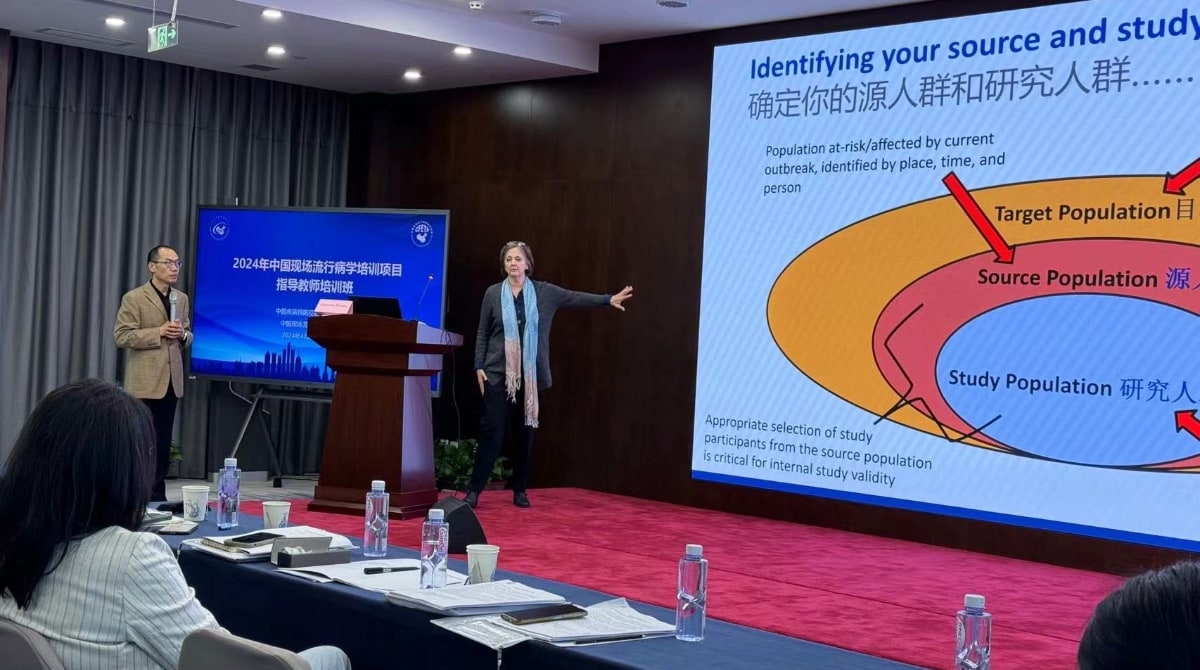At a glance
CDC collaborates with the government of China to prevent the spread of infectious diseases and support capacity to respond to public health threats. Key achievements include expanding the Field Epidemiology Training Program and increasing the evidence base for us of influenza vaccine in populations at increased risk for severe disease.

Overview

CDC has collaborated with partners in China for over 40 years and established an office in China in 2003. Currently, CDC supports public health initiatives in the following areas:
- Global health security
- Tuberculosis (TB)
- Influenza
Global health security
Strategic focus
CDC and the Chinese Center for Disease Control and Prevention, known as China CDC, collaborate to support global public health priorities.
Workforce development
CDC helps develop the public health workforce through the Field Epidemiology Training Program (FETP). Since 2004, CDC has collaborated with the China FETP (CFETP), a two-year advanced program that trains future disease detectives and public health leaders. CDC helped implement specialty tracks to prevent and control TB and non-communicable diseases.
CDC also provided technical support to establish two additional tiers of FETP—frontline (basic) and intermediate. These programs strengthen epidemiological capacity in underserved provinces and district-level health departments by focusing on early detection, outbreak investigation, and response.
Emergency response
Global health security investments and decades of collaboration have built a strong foundation upon which to respond to global public health emergencies.
During the COVID-19 pandemic, CDC and China CDC regularly convened virtual technical exchange meetings. Topics included serological testing, vaccine preparedness, epidemiology of COVID-19, vaccine efficacy and safety, and vaccine hesitancy.
Key achievements
- Experts from CDC and China CDC helped with early efforts to establish Africa CDC.
- CFETP-trained epidemiologists contributed to COVID-19 outbreak response activities in China.
- CDC and China CDC supported the 2014-2016 West Africa Ebola outbreak.
Tuberculosis
Strategic focus
Although the number of tuberculosis (TB) cases in China has significantly decreased, the country continues to have a high burden of TB, multidrug resistant TB (MDR-TB), and HIV-TB coinfection.
Since 2009, CDC has supported China CDC to implement collaborative projects designed to provide scalable models to strengthen TB prevention and control nationally. The priority areas include:
- Infection control – reducing the risk of TB transmission in health care facilities, especially among medical staff and other health care professionals.
- Surveillance – increasing the accuracy and use of TB surveillance system data for informed clinical decision-making and policy.
- Laboratory and quality assurance – improving the timeliness and accuracy of TB case diagnosis through laboratory management training.
Key achievements
- Research findings have led to updated policies and guidelines on TB infection prevention and control practices in health facilities.
- The 2021 national TB control guidelines describe the need for accurate, timely, and complete case reporting and data quality as critical components of the national TB surveillance system.
Influenza
Strategic focus
Influenza (flu) viruses change often, and public health officials must remain vigilant to detect changes. For over 20 years, CDC has supported the Chinese national influenza laboratory to detect and track seasonal and novel influenza viruses. CDC works in close partnership with:
- China CDC's National Influenza Epidemiology, Virology, and Pandemic Preparedness Centers
- Provincial and local CDCs
- Hospitals
- Academic institutions
China has advanced capabilities to monitor influenza viruses circulating in the country and assess the risk they pose to public health. These capabilities include environmental surveillance for avian influenza viruses among wild birds, domestic poultry, and in live poultry markets.
CDC maintains close ties with U.S. and China influenza experts to collaborate on key activities. These include:
- Estimating influenza disease burden and vaccine effectiveness among people at risk for poor outcomes from influenza, such as children, older adults and pregnant people
- Promoting influenza vaccination policy development and coverage
- Generating evidence to strengthen China's national influenza prevention, preparedness, and response guidelines
Key achievements
- CDC provided support to China to establish the Chinese National Influenza Surveillance Network.
- CDC supported China to increase capacity to detect and report influenza cases.
- CDC collaborated with China CDC to respond to outbreaks of human infection with avian influenza A(H7N9) virus.
Success story spotlight
Strengthening China's Field Epidemiology Training

Disease transmission knows no borders. In the post-COVID-19 era, the U.S. CDC and China CDC have recognized the urgent need for collaboration to safeguard public health. The CDC China office has been working with U.S. China CDC to prioritize global health, and by strengthening local workforce capacity to detect and report disease clusters.
The U.S. CDC China office has collaborated with the Chinese Field Epidemiology Training Program (CFETP) in training epidemiologists who come across China. A key component of this collaboration is the annual mentor training workshop, an essential platform for mentors to stay updated on program issues and academic skills.
CFETP recently held a workshop in Beijing, attended by over 100 mentors from various provincial CDCs and the Hong Kong Department of Health. U.S. CDC China staff, including Country Director Dr. Will Schluter, participated.
The workshop emphasized the importance of on-the-job training, with sessions on adult learning theory and practical exercises in study design. Feedback from mentors highlighted the value of these sessions in improving the quality of field investigations and surveillance.
This joint workshop demonstrates the strong collaboration between the two agencies, addressing CDC China's technical priorities and providing a valuable opportunity to engage with mentors and understand field needs.


